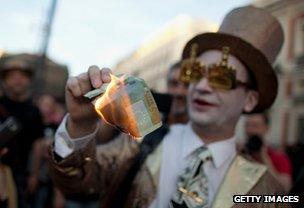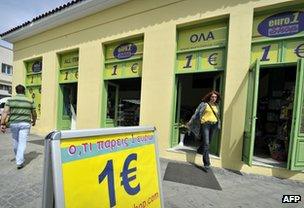The euro's survival 'requires political union'
- Published
- comments

Creating the currency union was not a random act of collective economic suicide, but was in some senses a rational or even noble project that was either premature or too late. The tragedy was that a succession of post-war leaders, whose intentions would be seen by many as honourable, made a series of disastrously ill-timed decisions.
Here is a great paradox: the big decision to press the button on creating the euro was a French attempt to shackle the economic and political power of a unifying Germany, but it has had the perverse consequence of reinforcing German power within the eurozone and the European Union.
A film on this subject which I've made with the producer John Thynne tries to shed light on the gravity of the mess they (and we) are in now - and what may be required for the eurozone to survive in the longer term.
If you had any doubts that we were minutes away from financial and economic catastrophe before Christmas, the European Central Bank does not.
"In the autumn of 2011, the conditions were very dangerous," one of its executive directors, Benoit Coeure, told me. "European banks were facing severe difficulties to fund themselves, to access finance, and we were very close to having a collapse in the banking system in the euro area, which would have also led to a collapse in the economy and to deflation. And this is something that the ECB could not accept."
So the ECB put 800 European banks on life support, by providing more than a trillion euros of emergency three-year loans to them. As Mr Coeure concedes, this so-called LTRO is a temporary prop, not a solution to the euro's ills.
"It is a pain-killer, a very powerful one... This period of calm has to be used by governments to fix the underlying issues, the fiscal (deficit) issues and the competitiveness issues that European countries are facing."
Since I saw Mr Coeure a few weeks ago, the calm has evaporated. There are escalating fears that Greece will leave the euro - and that the ensuing turmoil will force a more serious fracture of the currency union.
Benoit Coeure says the ECB "saved" Eurozone banks
The big indebted economies, Spain and Italy, look considerably weaker, their economies shrinking, and unemployment rising. The borrowing costs of their governments are soaring once more, a sign that investors are growing concerned again about the health of their public finances and of their banks.
What is required is a tremendous collective effort by the eurozone's members. In practice, this is widely seen to need a greater willingness by Germany to deploy more of its fearsome financial resources to help the weaker economies, such as Spain and Italy, in their period of painful transition.
But a sharing of the debt burden requires near revolution in the way the EU is governed, according to a trio of the grand old men of Europe.
"The crisis makes at least one thing obvious and that is we need more of Europe, we need the political union as the only way to save the stability of the euro," the former German chancellor, Gerhard Schroeder, said.
Given that his party, the SPD, could well be in power again next year, we may well see progress towards this political union.
One of the great figures of global central banking, Jean-Claude Trichet - president of the European Central Bank during many of the euro's formative years - made a similar point. "In a single market with a single currency… it seems to me that Europe could go for a federation."
Without such a federation, can the single currency survive, I asked Helmut Schlesinger, another influential central banker who has seen the odd financial crisis at close quarters and was president of the Bundesbank when sterling was forced out of the European Exchange Rate Mechanism in 1992.
"I cannot make any long-term predictions in this regard," he said. "One should consider that monetary unions, or more precisely, coin unions, have survived for a long time, but never for more than three or four decades.

There are fears Greece may ditch the euro
"My personal experience with the German currency is that it has undergone changes at three occasions during my lifetime. When I was born, it was changed into the reichsmark. When I began to work, it became the deutsche mark. And when I became a pensioner, it became the euro.
"The average lifetime of a currency is, as you can see, limited, as a rule, except when it is a great state with an endlessly long, beautiful history, from the kings of the Middle Ages until the Queen nowadays. Then you have got a long monetary history."
But in Europe, that is not the case. "And I would say that either we get the United States of Europe, that is an actual political union, and then that political union gets its own currency. But then it is no monetary union any longer, but the currency of that new state.
"Or let's stay with the current situation which we find ourselves in at the moment, and then it could be that this monetary union will not necessarily dissolve, but change, extend, scale down. I do not know. My horizon, my prognosis is very limited in time."
So what is going to happen: creation of the European superstate and survival of the euro, or a disastrous monetary and political disintegration? I hope Thursday's programme will give you the information you need to form a judgement on will determine not just the eurozone's future prosperity but Britain's too.
The Great Euro Crash with Robert Peston is on BBC Two at 21:00 BST on Thursday 17 May. Watch online (UK only) via iPlayer at the above link